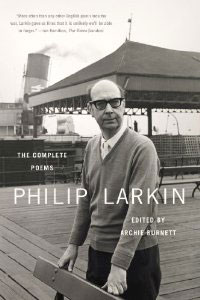Review of Philip Larkin’s The Complete Poems
Liking the Poems, If Not the Man
It’s easy to dislike Philip Larkin, the person. He was, according to his biographer Andrew Motion, petty, snappish, pessimistic, narrow-minded, and politically unsavory. Indeed, since his death in 1985, and even more so after the 1992 publication of his letters and Motion’s 1993 A Writer’s Life, Larkin-hating has become something of a cottage industry.
However, for those who admire sharp, witty, occasionally breathtaking poems (and who doesn’t?), disliking Philip Larkin, the poet, is another matter entirely. Larkin published only four books of poetry during his lifetime, and his reputation rests on the last three: The Less Deceived, The Whitsun Weddings, and High Windows.

His most frequently anthologized poem, “This Be the Verse,” which begins, “They fuck you up, your mum and dad,” gives a sense of his cynical worldview, but the poem is slight compared to much of his later work. Readers new to Larkin’s poetry will be astonished at the density of thought and feeling he can pack into even a few stanzas. To enter poems like “Church Going” and “The Whitsun Weddings” and “The Old Fools” is to be fully immersed in the perspective of another human being. The experience is akin to having a great novel condensed into a couple of pages.
Larkin’s Collected Poems was published in 1988, so readers might wonder what they are getting with the 729-page Complete version? The answer is 350 pages of detailed notes about the composition and publication history of each poem. Most of these notes — a word crossed out here, a phrase changed there — will be of interest primarily to scholars. Nevertheless, by skimming these pages a biography emerges of a deeply eccentric man whose idiosyncrasies are the basis for his strongest poetry.
Larkin was a shrewd judge of his own work, and the section of poems not published during his lifetime, generally mediocre jottings about his usual preoccupations — boredom, bad relationships, despair — simply highlights how good he was when he was on. Compare, for instance, this untitled couplet, “THE MAYOR OF BRISTOL WAS DRINKING GIN, / HE OPENED HIS MOUTH AND THE FART ROLLED IN,” with the concluding stanza of “High Windows”: “Rather than words comes the thought of high windows: / The sun-comprehending glass, / And beyond it, the deep blue air, that shows / Nothing, and is nowhere and is endless.” We might well be reading the work of two entirely different poets, although at his best Larkin was a master of combining high and low diction, as in the opening to “Sad Steps”: “Groping back to bed after a piss / I part thick curtains, and am startled by / The rapid clouds, the moon’s cleanliness.” Surely this is the first time in English literature someone thought to rhyme “piss” and “cleanliness.”
Randall Jarrell said that a good poet is someone “who manages, in a lifetime of standing out in thunderstorms, to be struck by lightning five or six times; a dozen or two dozen times and he is great.” By that standard, Larkin — for all his unpalatable personal opinions — is a great poet, well worth reading and rereading, however his thorny, wonderful poems are packaged.



